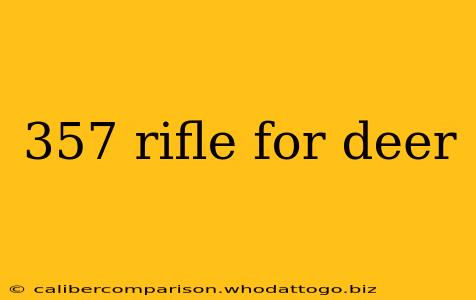The .357 Magnum cartridge, a powerhouse in the handgun world, also holds a respectable place in rifle hunting, particularly for deer. While not the most potent round available, its versatility, affordability, and manageable recoil make it a viable option for certain hunting situations and ethical harvesting. This guide will delve into the specifics of using a .357 rifle for deer hunting, covering its pros and cons, ammunition choices, and ethical considerations.
Is a .357 Rifle Sufficient for Deer?
The effectiveness of a .357 rifle for deer hunting hinges on several factors: shot placement, bullet selection, and the size of the deer. A well-placed shot from a .357 rifle using appropriate ammunition can ethically harvest deer, particularly smaller specimens. However, it's crucial to understand its limitations compared to more powerful cartridges. Long-range shots are generally discouraged due to the .357's trajectory and energy drop-off.
Ethical Considerations: Responsible hunters prioritize a quick, clean kill. The .357 Magnum, while capable, demands precise shot placement to ensure a humane harvest. A poorly placed shot can result in a wounded animal, which is both unethical and illegal.
Advantages of Using a .357 Rifle for Deer
- Cost-Effectiveness: .357 Magnum ammunition is relatively inexpensive compared to many larger calibers, making it a budget-friendly option for hunters on a tighter budget.
- Manageable Recoil: The recoil of a .357 rifle is generally manageable, even for newer hunters, allowing for quicker follow-up shots if necessary (though precise shot placement is paramount, minimizing the need for multiple shots).
- Versatility: A single firearm can handle both handgun and rifle cartridges, offering versatility depending on the hunting situation. Many hunters appreciate the option to utilize the same firearm for close-quarters defense, too.
- Compact and Lightweight: .357 rifles are often lighter and more compact than larger-caliber rifles, making them easier to carry on long hikes.
Disadvantages of Using a .357 Rifle for Deer
- Limited Range: The .357 Magnum's trajectory and energy drop-off are significant beyond 100 yards. Accurate shots at longer ranges are challenging and should be avoided.
- Penetration: While sufficient for smaller deer at close ranges, penetration may be limited, especially with less powerful ammunition. This is dependent on bullet construction and shot placement.
- Energy Transfer: Compared to higher-caliber cartridges, the .357 Magnum delivers less energy upon impact, potentially leading to a less immediate kill if shot placement isn't perfect.
Ammunition Selection: Crucial for Success
Choosing the right ammunition is crucial for ethical and successful deer hunting with a .357 rifle. Look for bullets designed for hunting, prioritizing:
- Hard-Cast Bullets: These bullets offer superior penetration and are less likely to deform upon impact.
- Jacketed Hollow Points (JHP): JHPs expand upon impact, increasing energy transfer and improving lethality, particularly at closer ranges. However, penetration can be less than hard-cast bullets.
- Controlled-Expansion Bullets: These bullets aim for a balance between penetration and expansion, providing a good compromise.
Avoid: Full metal jacket (FMJ) ammunition is generally not recommended for hunting due to its reduced expansion and increased risk of pass-through shots.
Shot Placement: The Key to Ethical Hunting
Regardless of caliber, accurate shot placement is paramount for a clean, quick kill. Focus on vital areas:
- Heart-Lung Shot: Aiming for the heart and lungs is crucial for a swift kill. This area provides a large target and offers the highest chance of a humane harvest.
- Neck Shot: A well-placed neck shot can be effective, but it requires exceptional accuracy and precision.
Conclusion: Weighing the Pros and Cons
The .357 rifle can be effective for deer hunting, particularly at closer ranges and when hunting smaller deer. However, it's crucial to understand its limitations. Responsible hunters should carefully consider these factors, choose appropriate ammunition, practice diligently, and prioritize ethical harvesting practices. If hunting larger deer or at longer ranges, a more powerful caliber is recommended. Remember, ethical hunting practices are paramount and responsible firearm usage is crucial. Always follow local hunting regulations and prioritize safety.

